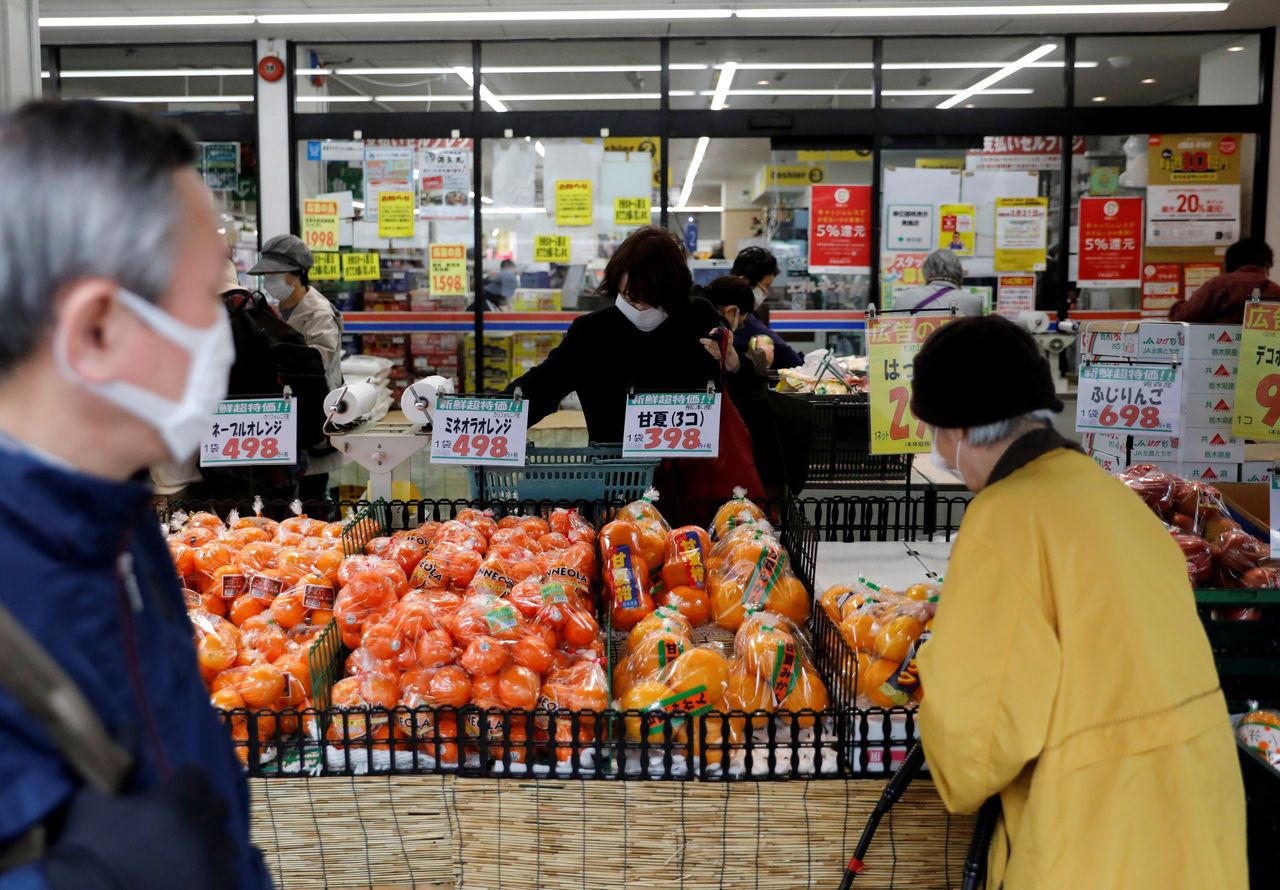Hit by commodity inflation, Japan firms gradually pass on costs: Reuters poll
Newsfrom Japan
- English
- 日本語
- 简体字
- 繁體字
- Français
- Español
- العربية
- Русский

FILE PHOTO: Shoppers wearing protective face masks, following an outbreak of the coronavirus disease (COVID-19), are seen at a supermarket in Tokyo, Japan March 27, 2020. REUTERS/Issei Kato/File Photo
By Tetsushi Kajimoto
TOKYO (Reuters) - About two-thirds of Japanese firms are passing on rising raw materials costs to customers or planning to do so as surging global commodity markets drive up import costs and squeeze bottom lines amid the COVID-19 pandemic, a Reuters poll showed.
Few Japanese firms are considering cutting prices of their main goods and services in the latter half of this year, whereas most would go ahead with price hikes or keep them unchanged, the poll showed.
The Corporate Survey signalled a move away from a price-setting stance seen during nearly two decades of deflation in which companies cut prices of their goods and services out of fears price hikes would drive away cost-conscience customers.
The shift could be encouraging for Bank of Japan (BOJ) policymakers who are grappling with stubbornly weak inflation due in part to companies' bearish price-setting behaviour and adaptive inflation expectations among the public.
"We are preparing to negotiate with customers to raise prices," a manager of a pulp and paper company wrote in the survey on condition of anonymity.
"At the same time, we are also cutting costs by diversifying sources of procurement and purchases."
The June 30-July 9 survey, which canvassed 503 big and midsize non-financial corporations garnering 240 replies, found 15% of firms were able to pass on raw materials costs to customers and 46% would consider following suit, while 39% were unable to do so.
A slim majority would keep prices of their main goods and services steady in the latter half of this year and 45% expect to raise them, while just 3% plan to cut them.
In comparison, the previous survey taken a year ago had found three quarters of firms would keep prices flat and 17% would cut them, while just 8% planned to raise them.
Two-thirds of firms saw rising global commodity costs putting downward pressure on profit for this fiscal year.
Japan's wholesale prices rose 5.0% year-on-year in June, Bank of Japan data showed on Monday, after a 5.1% gain in May, which was the fastest pace of growth since September 2008.
However, rising wholesale inflation is unlikely to lead the BOJ to unwind massive monetary stimulus any time soon, as years of printing money has failed to spur inflation to its 2% target.
Nearly three-fourths of non-financial firms see the BOJ's ultra-low interest rate policy positively affecting their businesses, the Corporate Survey showed.
Asked how long the BOJ should keep its current easing, just 6% called for an immediate end, while the rest were split, with 39% calling for it to continue 1-2 years, 26% expect it to last 3-4 years and 29% want it to stay until 2% inflation is met.
"There's no prospect for achieving the inflation target," a manager of an electric machinery maker wrote in the survey. "There's a chance side-effects that run counter to market principles could outweigh benefits."
(Reporting by Tetsushi Kajimoto; Editing by Christopher Cushing)
(c) Copyright Thomson Reuters 2021. Click For Restrictions -
https://agency.reuters.com/en/copyright.html